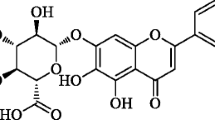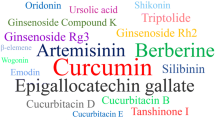Abstract
The anti-tumor effects of Chinese herbal medicines and their prescription preparations attracted more and more attention at home and abroad. Thus, it is becoming a hot research topic to exploit the anti-tumor mechanisms of Chinese medicine, and some of them have been partly clarified with the improved research ability to date. In brief, the Chinese herbal medicines possess unique advantages on the treatment of tumors through their multiple actions on multiple targets.
Similar content being viewed by others
References
Wang Z, Liu CY, Hao HD, Wang SY, Cai S, Cai YW. Study on Yiqihuoxue herb of inducing apoptosis of Lewis cancer mouse. Chin J Inform Tradit Chin Med (Chin) 2005;12(2):42–43.
Xiao BH, Zhang CL, Wu X. Experimental study on the effect of Euphorbia Esula on Lewis lung cancer in mice. China J Chin Materia Med (Chin) 2006;31:1002–1005.
Dong CY, Ma ZJ, Wu HY, Zhang J. Inhibitory effect of emodin on proliferation of human gastric adenocarcinoma cells SGC27901 in vitro. J Harbin Med Univ (Chin) 2008;42:358–360, 363.
Swamy S, Huat B. Intracellular glutathione depletion and reactive oxygen species generation are important in alphahederin-induced apoptosis of P388 cells. Mol Cell Biochem 2003;245:127–139.
Chen WX, Zhang F, Yang HC, Liu S, Guo X, Li J. The effect of realgar on apoptosis of transplanted ovarian SKOV3 carcinoma cells in nude mice. Tumor 2007;27:787–790.
Zhang CY, Gong YX, Ma H, An CC, Chen DY. Studying the effect of trichosanthin on choriocarcinoma cells with both two-photon and confocal laser scanning microscopy. Prog Biochem Biophys 2001;28:717–721.
Hu GS, Shi W, Liao AJ, Zeng B, Cao WT. The effect of curcumin on expression of P30, P53, c-myc and acetyl histone H3, H4 in the gastric cancer cell. J Nanhua Univ (Med Ed) (Chin) 2005;33:457–460.
Yang ZG, Xiong D, Cai YG, Liang L, Li QH. Action mechanism of HL-60 cell apoptosis induced by genistein. J Clin Rehabil Tissue Engineer Res (Chin) 2008;29:5607–5610.
Chen D, Ni JS, Wang XR, Tian K, Wang GL, Wu JX. MCF-7 cell apoptosis induced by 20 (S)-ginsendoside Rg3 in mammary carcinoma. J Jilin Univ (Med Ed) (Chin) 2008;34:610–614.
Jian J, Liu LZ, Li XY, Hu ZF, Wang T, Huang Y. Effects of ginsenoside Rg3 on the expression of Pim-3 and Bad in human hepatocarcinoma cell lines. World Chin J Digestol (Chin) 2008;16:2229–2233.
Ji YL, He JT, Zhou QH, Chen J, Li Q, Zhu J, et al. The inhibiting effect and its molecular mechanism of Tanshinone on human lung cancer cell line in vitro. Chin J Lung Cancer (Chin) 2008;11:202–205.
Liang Y, Jing LP, Wang J, Song WX, Fu R, Qu W, et al. Tanshinone II A induced differentiation of initial treatment, relapse and ATRA resistance of human acute promyelocytic leukemia cell in vitro. Chin J Hematol (Chin) 2006; 27:62–63.
Shi SL, Wang GH, Ma ZY, Shi JL, Lin CJ, Li QF. The effect of tanshinone II on the morphology and terminal differentiation of MG-63 cell. Prog Modern Biomed (Chin) 2008;8:801–804.
Wang L, Zhou GB, Liu P, Song JH, Liang Y, Yan XJ, et al. Dissection of mechanisms of Chinese medicinal formula Realgar-Indigo naturalis as an effective treatment for promyelocytic leukemia. Proc Nat Acad Sci 2008;105:4826–4831.
Guo X, Guo Y. Effect of baicalin on differentiation of human hepatocellular carcinoma cell line BEL-7402 in vitro. World Chin J Digestol (Chin) 2008;16:1119–1123.
Lan HL, Wang CJ, Liu YZ, Li JJ. The effect of JianPiHuaYu Chinese composite (960) reversed the malignant phenotype of human hepatocellular carcinoma cell SMMC7721. Tradit Chin Med J (Chin) 2005;4:41–45.
EI-Mowafy AM, Alkhalaf M. Resveratrol activiates adenylyl-cyclase in human breast cancer cells: a novel, estrogen receptor-independent cytostatic mechanism. Carcinogenesis 2003;24:869–873.
Zhang LJ, Wang TT, Wen XM, Wei Y, Peng XC, Li H, et al. Effect of matrine on HeLa cell adhesion and migration. Eur J Pharmacol 2007;563:69–76.
Anesini C, Ferraro G, López P, Borda E, Borda E. Different intracellular signals coupled to the antiproliferative action of aqueous crude extract from Larrea divaricata Cav. and nor-dihydroguaiaretic acid on a lymphoma cell line. Phytomedicine 2001;8:1–7.
Singh F, Gao DY, Lebwohl MG, Wei HC. Shikonin modulates cell proliferation by inhibiting epidermal growth factor receptor signaling in human epidermoid carcinoma cells. Cancer Lett 2003;200:115–121.
Blaskovich MA, Sun JZ, Couldtor A, Turkson J, Jove R, Sebti SM. Discovery of JSI-124 (cu-curbitacin I), a selective Janus kinase/signal transducer and activator of transcription 3 signaling pathway inhibitor with potent anti-tumor activity against human and murine cancer cells in mice. Cancer Res 2003;63:1270–1279.
Zhang XJ, Han L, Ling LL, Li QS, Ji YB, Fang GZ. Study of betulonic acid on anti-tumor by inhibiting PI3K/AKT pathways. J Harbin Univ Com (Nat Sci Ed) (Chin) 2008;24:261–264.
Liu HY, Zang CB, Emde A, Planas-Silva MD, Rosche M, Kühnl A, et al. Anti-tumor effect of honokiol alone and in combination with other anti-cancer agents in breast cancer. Eur J Pharmacol 2008;591(1–3):43–51.
Tao XH, Tang DC. Brief review on anti-angiogenesis effect of Huoxuehuayu Chinese medicines. Chin Arch Tradit Chin Med (Chin) 2003;21:2085–2086.
Yang HP, Li JM, Tang CL, Gong L, Wang HJ. Role of active components of curcumin in anti-angiogenesis in vitro. Acta Academiae Med Militaris Tertiae (Chin) 2005;27:1068–1070.
Liang B, Huang MJ, Ding ZS. Empirical study of the antiangiogenesis effect of Demethoxycurcumin. Zhejiang J Integr Tradit Chin West Med (Chin) 2008;18(2):69–70.
Guo JL, Wang SJ. Experimental study on mechanisms of Cortex Ailanthi in inhibiting sarcoma180 angiogenesis. Chin J Exp Tradit Med Formul (Chin) 2008;14(8):48–50.
Cao WT, Shi W. Advances in anti-tumor angiogenesis of resveratrol. J Int Oncol (Oncol Sect Foreign Med Sci) (Chin) 2006;33:918–921.
Chen MW, Ni L, Zhao XG, Niu XY. The inhibition of 20(R)-ginsenoside Rg3 on the expressions of angiogenesis factors proteins in human lung adenocarcinoma cell line A549 and HUVEC304 cell. China J Chin Materia Med (Chin) 2005; 30:357–360.
Xu M, Bu P, Li YY. Effects of an extract from Scutellaria barbatae D.DON on tumor angiogenesis in vitro. World Chin J Digestol (Chin) 2007;15:2215–2219.
Zhen GJ, Yu YD, Shi J. Effect of Xiaotan Sanjie Recipe on the angiogenesis of nude mice with human gastric carcinoma. World Chin J Digestol (Chin) 2008;15:936–940.
Liu SH, Lu Z, Li X, Feng P, Kong QL, Sun HM, et al. Effect of Huqi San and mistletoe on human hepatocarcimoma cells and telomerase activity. Pharmacol Clin Chin Materia Medica (Chin) 2007;23(3):63–65.
Zhang YH, Chai WZ, Zhao JX. Fuzheng-Yiliu Decoction on tumor cell telomerease and blood viscosity in tumor-bearing mice. J Beijing Norm Univ (Nat Sci) (Chin) 2008;44:334–336.
Zhang L, Wang Y, Mao HT, Wen PE, Cui SL, Li XB. Study on the inhibition of telomerase activity and regulated mechanism in human cancer cell by Icarrin. Chin J Immunol (Chin) 2002;18:191–194.
Zhang SH, Gao SF, Hao ZM. The effect of arsenic trioxide on the telomerase activity expression in human ovarian cancer cell line SKOV3. Shaanxi Med J (Chin) 2008;37:972–974.
Mei SJ, Yin JJ, Wang XM. Effects of arsenic trioxide (As2O3) on telomerase activity of human gastric cancer BGC-823 cell line As2O3. Cancer Res Prev Treat (Chin) 2007;34:927–931.
Hu LJ, Wen B, Zhou FS, Huang SG, Huang SP. Effects of “Liandai Tablet” on telomerase activity and hTERT mRNA expression in nude mice of colonic cancer. Shanghai J Tradit Chin Med (Chin) 2008;42:71–73.
Yu XF, Zou J, Ran ZH. Killing effect of oxymatrine on human gastric cancer cell line MKN45 and its mechanism. World Chin J Digestol (Chin) 2007;15:1719–1724.
Lin ZH, Fu M, Liao WM, Lin D, Chen XG, Wang HX, et al. The primary study on FFXCHT inhibiting the growth of EAC bearing tumor and increasing humoral immunity. Int J Intern Med (Chin) 2008;35:190–193.
Li J, Xie M, Gan Y. Effect of Xiaochaihu Decoction and different herbal formulation of component on inhibiting H22 liver cancer in mice and enhancing immune function. China J Chin Materia Med (Chin) 2008; 33:1039–1044.
Zhang HJ, Tang XY, Ju BL, Song BH. Effect of Yupingfengsan on the growth of tumor and immunological function in tumor-bearing mice. Chin J Cell Mol Immunol (Chin) 2008;24:683–685.
Liu LH, Hao YY, Guan BJ, Wang YL, Zhang Y, Xu W. Naphthoquinones from Zicao reverses the immunosuppression of transplantable carcinomas. Chin J Immunol (Chin) 2007;23:1097–1101.
Ying M, Su XL, Qu YZ, Eer D. Inhibition of ursolic acid on S-180 sarcoma in mice and its mechanism. Chin J Anat (Chin) 2007;30:546–550.
Li TX, Yao L. Basic and clinical researches on antitumor effects of antimalarial artemisinin and its derivatives. Chin J New Drugs Clin Rem (Chin) 2008; 27:227–230.
Sadava D, Phillips T, Lin C, Kane SE. Transferrin overcomes drug resistance to artemisininin human smallcell lung carcinoma cells. Cancer Lett 2002; 179:151–156.
Reungpatthanaphong P, Mankhetkorn S. Modulation of multidrug resistance by artemisinin, artesunate and dihydroartemisinin in K562/adr and GLC4/adr resistance cell lines. Biol Pharm Bull 2002; 25:1551–1561.
Mukanganyama S, Widersten M, Naik YS, Mannervik B, Hasler JA. Inhibition of glutathione s-transferases by antimalarial drugs possible implications for ciucumventing anticancer drug resistance. Int J Cancer 2002; 97:700–705.
Li XR, Jiao ZH, Liu PM. Studies on Rhaponticum extract reversed multi-drug resistance and induced apoptosis on tumor cell. J Shandong Univ Tradit Chin Med (Chin) 2008;32:74–76.
Li GH, Sun FJ, Dong X, Li XJ, Yang SB. Revertion of 70% ethanolic extract from Huanglian Jiedu Decoction on mice S180 cell MDR relative factor expression. Chin Tradit Herbal Drugs (Chin) 2007; 38:1050–1052.
Liu CJ, Liu JG, Yu TC, Luo ZJ. Reversal effect of Tan microemulsion on multidrug resistance. J Jilin Univ (Med Ed) (Chin) 2007; 33:293–296.
Xu M, Zhou B. Experimental research on tetrandrine reversing chemotherapy resistance and apoptosis resistance in lung cancer cell. J New Chin Med (Chin) 2006;38(6):90–91.
Author information
Authors and Affiliations
Corresponding author
Additional information
Supported by the Key Laboratory of Carcinogenesis and Translational Research (Ministry of Education)
Rights and permissions
About this article
Cite this article
Han, Sy., Li, Pp. Progress of research in antitumor mechanisms with Chinese medicine. Chin. J. Integr. Med. 15, 316–320 (2009). https://doi.org/10.1007/s11655-009-0316-4
Received:
Published:
Issue Date:
DOI: https://doi.org/10.1007/s11655-009-0316-4




